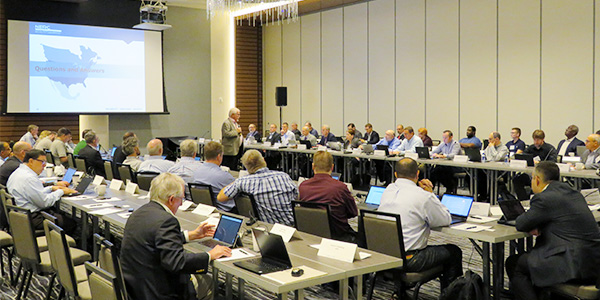By Rich Heidorn Jr.
MINNEAPOLIS — NERC’s Stakeholder Engagement Team (SET) has agreed to expand the membership of the new committee that would replace the Planning, Operating and Critical Infrastructure Protection committees, stakeholders were told last week.
SET member Lloyd Linke, of the Western Area Power Administration, told a joint meeting of the OC and PC that the new Reliability and Security Council (RSC) will have 34 voting members: two each from Sectors 1-10 and 12, for a total of 22; 10 at-large members, a chair and a vice chair. The committee will also have five nonvoting members, including a NERC staffer as secretary, along with two U.S. federal representatives, and two Canadian representatives: one federal and one from the provinces.

The Planning [pictured] and Operating committees met together last week in Minneapolis. | © ERO Insider
If a sector does not have two members, the vacant slot will be filled by an additional at-large member to keep the total at 34 members.
The RSC will be only about a quarter of the size of the three technical committees it will replace, which have almost 120 voting members. But the SET’s original plan called for only one member from each sector, a proposal that met opposition. (See NERC Board Hears Debate over Committee Reorg.)
Linke also said the RSC meetings will be open to other stakeholders.
He said the move was driven by a desire for a “better functional alignment” between the technical comms and the Reliability Issues Steering Committee (RISC). Reducing travel and hotel costs “wasn’t a primary driver,” he said. “It wasn’t a big driver at all.”
The RSC members will have three- and two-year terms initially, then revert to staggered two-year terms. Once the committee is set up, the RSC nominating process will follow the model of the Compliance and Certification Committee.
Linke said one of the initial tasks of the RSC will be determining how to continue the “lessons learned” sharing and awareness functions used by the technical committees.
“We don’t want to lose that engagement,” said John Moura, NERC director of reliability assessment and technical committees. Concerns about the potential loss of functions “hit [NERC] staff strongly,” he said.

Peter Brandien, ISO-NE | © ERO Insider
The SET rejected suggestions that the technical committees evaluate their subcommittees to determine their future. “There was a desire not to tie the hands of the new RSC,” Linke said.
The schedule calls for the RSC to hold its first meeting in March along with the three technical committees, which would end their operations effective June 1.

Robert Blohm, Keen Resources | © ERO Insider
Some members expressed opposition to the proposed committee merger after the OC and PC split for their separate meetings.
“I don’t think the new structure is going to have the amount of expertise or dedicate as much time as [the technical committees] do,” Peter Brandien, vice president of systems operations for ISO-NE, said at the PC meeting.
“I think the most important aspect of this plan is the change of this legislative structure from one that is wholly elected to one that is partly elected and partly appointed. The world’s currently best-known example of that kind of legislature is Hong Kong,” said Robert Blohm, managing director of Keen Resources. “That’s my comment.”



